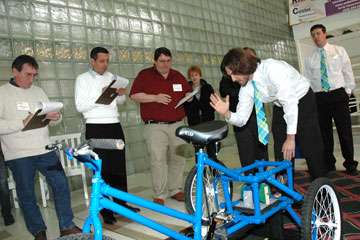Engineering solutions to real-world problems

A BlueVision Web Scraper that populates a database that tracks and evaluates press coverage. A hydrogen fuel-cell vehicle that will race in next year's Shell Eco-marathon Americas competition. A small cell tower, called the IntraCell, that extends the range of cell service or provides service to areas without coverage.
Those and 13 other intriguing and problem-solving engineering projects were on display today in the College of Engineering and Applied Science's Engineering Design Competition in the North Classroom atrium.
In their senior year, engineering students take a Senior Design course that is the culmination of the knowledge and skills they've acquired at CU Denver. They apply what they've learned to real-world problems.
"It just amazes me that they can create so much in such a little amount of time," said Marc Ingber, dean of the College of Engineering and Applied Science. He noted that many of the student teams performed analyses and project development for clients, such as the Regional Transportation District, Colorado Department of Transportation, Oracle and the City of Fort Morgan.
"It gives me confidence that they're going to go out and be extremely productive engineers and computer scientists," Ingber said.
A panel of industry judges inspected each project and asked questions of each team of students. The judges select the best overall project ($1,000) and a top project from each discipline ($250), including civil engineering, computer science and engineering, electrical engineering and mechanical engineering.
A team from the Department of Mechanical Engineering received considerable attention for their TheraGO, a motor-assisted therapeutic tricycle that promotes cognitive and muscular development in children ages 8 to 14 with special needs. The team's project ended up winning the $1,000 overall prize.
Team member Chad Glidden said he was inspired to build something like the TheraGO because he has an 8-year-old autistic son who has difficulty with balance and muscle memory. The tricycle has an electric motor, a continuously variable transmission, independent rear-wheel stabilizer and pressure-sensor pedals. The pedals allow riders to learn that the more pressure they apply the more the tricycle moves forward.
While the tricycle is designed for outdoor riding, it could be used in physical therapy offices for children who have cerebral palsy, multiple sclerosis, Down Syndrome or are recovering from a broken bone, Glidden said. "Anyone who has balance or motor planning issues could benefit from this."
Team member Ryan Reece added, "Hopefully, it will open up (riding) participation for kids who should be out riding with their families."
The TheraGO team applied for and received a UROP (Undergraduate Research Opportunity Program) grant of $3,600 to help pay for their project.
On another project, which won a $250 deparrtmental prize, a group of civil engineering students were asked to design a diverging diamond interchange (DDI) at the Interstate 70-Quebec Street interchange. Missouri has built seven DDIs so far and the concept's popularity is growing nationally. The system can improve capacity of an interchange with fewer lanes.
"The purpose of this is to allow the incoming traffic to just merge with the through traffic on the arterial," said team member Drew Stewart.
But the CU Denver civil engineering team members, all of whom are graduating Saturday, found that the DDI system works best where the current and projected traffic volumes are both very high. In the case of I-70-Quebec, the traffic volume is high on the arterial (Quebec), but not at high enough volumes for the on-ramps.
So the students recommended against a DDI at that interchange. Instead, they suggested a package of improvements:
- re-timed lights;
- structural remediation of the bridge; and
- improved drainage problems in the area.
Results of this year's Senior Design Competition:
— Overall ($1000): TheraGO
— Departmental ($250):
Mechanical: H2 Eco Challenger
Civil: CDOT Diverging Diamond
Computer Science and Engineering: Finite Resource Scheduler
Electrical: IntraCell
Provided by University of Colorado Denver


















